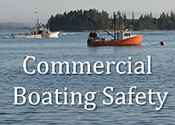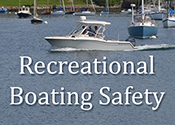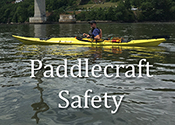Safety is important to both commercial fishermen and recreational boaters. Marine Patrol not only enforces safety laws and regulations, Officers also work to publicize safety laws and practices during routine patrols. Click an image below to jump to the relevant section.
Commercial Fishing Safety
According to the National Institute for Occupational Safety and Health (NIOSH) commercial fishing is one of the most hazardous occupations in the United States with a fatality rate over 40 times higher than the national average in 2019. Characteristics of fishing operations include heavy weather, long work hours, strenuous labor, and working with hazardous machinery.
Depending on the fishery, there are required training programs for commercial harvesters.
Scallops and Urchins
Commercial scallop or sea urchin divers must provide a current (non-expired) copy of a Cardio-Pulmonary Response (CPR) Card and First Aid Card or equivalent.
First time sea urchin and scallop diving tender license holders must provide a copy of a current (non-expired) Cardio-Pulmonary Response (CPR) Card and First Aid Card or equivalent at the time of a new license application. New tender license applicants are also required to complete the DMR Diving Safety Course for Tenders
Lobster
Apprentice fishermen must successfully complete a United States Coast Guard approved Fishing Vessel Drill Conductor Training course. Contact information for such courses may be obtained through the US Coast Guard, Sector Northern New England, Prevention Department, Commercial Fishing Vessel Safety Program, telephone: (207) 780-3256.
The USCG approved course must include the following: Abandoning the vessel; Fire Fighting on board a vessel; Recovering an individual from the water; Minimizing the effects of unintentional flooding; Launching survival craft; Donning immersion suits and personal flotation devices; and Making a voice radio distress call and using visual distress signals.
With certain exemptions, documentation of completion of approved training is required prior to license issuance or renewal.
Recreational Boating Safety
Recreational boating safety is also a focus of the Maine Marine Patrol. Each year prior to the recreational boating season, Marine Patrol conducts outreach efforts to remind boaters of the following safety measures:
Boater Education
- Beginning January 1, 2024, a person born on or after January 1, 1999, may not operate a motorboat of twenty-five (25) horsepower or greater for recreational boating purposes on territorial or inland waters of this State, unless that person is 12 years of age or older and has completed a boater safety and education course.
- These persons must possess and present a boater safety and education course certificate for inspection upon request to a law enforcement officer.
- There are a few exemptions, such as for registered Maine guides (hunting, fishing, and recreational guides only), commercial fishermen, daily boat renters, and merchant mariners.
- Visit the Boating Safety and Education Course page on the Maine IF&W website for more information on the law, education courses, and frequently asked questions.
Wear a Life Jacket
- In Maine, all children 10 and under must wear a life jacket. Adults don't have to wear them, but they must be available on board for every occupant.
- The latest U.S. Coast Guard statistics show 75 percent of boating fatalities were due to drowning, and that 86 percent of those who drowned were not wearing life jackets.
- New life jackets are much more comfortable, lightweight and stylish than the bulky orange style most boaters know. There are innovative options, such as inflatable life jackets, allowing mobility and flexibility for activities like boating, fishing, paddling or hunting, and are much cooler in the warmer weather.
Check Your Boat and Gear
- Safe boaters should also have working navigation lights, visual distress signals, sound signaling devices, VHF radio, cell phone, proper ventilation, and properly displayed registration numbers.
- A thorough check of fire extinguishers and flares should be done to make sure they work.
Plan Before You Go
- Always check the local marine forecast before heading out on Maine's coastal waters.
- Boaters should file a float plan with a friend or relative, letting them know where you are going and when you plan to return.
Don't Boat Under the Influence
- Another important safety issue is drinking and boating. According to Coast Guard statistics, alcohol is a leading contributor in deadly boating accidents.
- Marine Patrol will prosecute people who are under the influence while operating a boat
Paddlecraft Safety
- Kayakers, canoeists and paddle boarders should always wear a life jacket.
- Bring a hand-held VHF radio and a cell phone in a waterproof case.
- Carry signaling devices (whistle, mirror, flares) in a pocket of your life jacket.
- A personal locator beacon will relay your precise location to rescue agencies if you're in distress.
- Kayakers should always carry a paddle float and bilge pump.>
- With ocean temperatures in many places less than 50 degrees, paddlers should dress for the water temperature and consider wearing a dry suit or a wet suit.
- Place an "IF FOUND" sticker on smaller craft like kayaks, canoes, and paddle boards, with contact information including a phone number.
- For a free IF FOUND contact sticker, contact your nearest harbor master, marina, sporting goods store Game Warden or Marine Patrol Officer.
- If Marine Patrol or Coast Guard finds one of these small vessels with nobody onboard, they can call the number and confirm whether the owner is missing, potentially avoiding an unnecessary search and rescue operation..
If you have questions about commercial fishery or recreational boating safety laws and practices, contact your local Marine Patrol Officer


